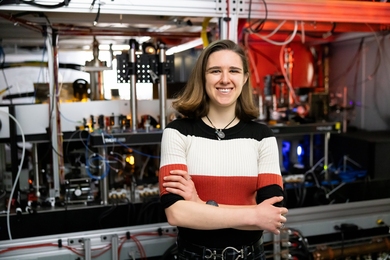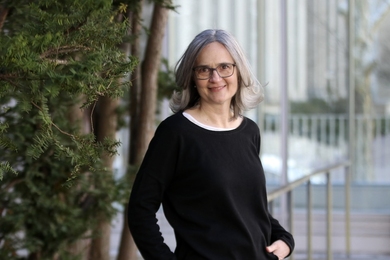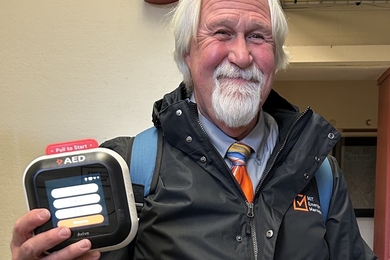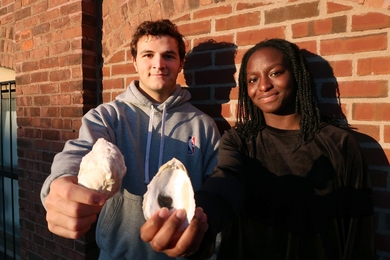Giving a gift that keeps on giving, a group of students last week launched an online interactive information source they designed and developed for parents at the Boston Medical Center's pediatrics clinic.
Parents can access the web-based program using a touchscreen kiosk-style computer installed near the clinic's entrance to get information on children's illnesses and treatments; health insurance; prescriptions; related social services such as housing, cash assistance and job training; and even short bios of the medical center's pediatricians.
The $20,000-plus project was managed by Rebecca Grochow, a junior majoring in biology and minoring in economics, who started working on the Family Information Source (FIS) three years ago.
"We wanted to provide parents with a lot of information that was easy to access privately, all in one place. Being from MIT, of course we started to look toward technology.
"A lot of the parents don't speak English, and if they do, they may not read it very well. We try to write everything at the sixth-grade level," said Ms. Grochow, who added that the majority of clients at the Boston Medical Center (BMC) are from low-income families. The hospital was formed several years ago when Boston City Hospital and the Boston University Medical Center merged.
Ms. Grochow's mentor on the project is Dr. Howard Bauchner, director of the Division of Academic Pediatrics at the BMC. MIT senior research scientist Walter Bender and graduate student Sunil Vemuri, both of the Program on Media Arts and Sciences, provided technical support.
Funding for the project came from the BMC's Kid's Fund; Medicine in the Public Interest, a nonprofit organization in Boston; and MIT's Public Service Center and Community Service Fund. The FIS web site can be used from any online computer.
PROJECT HEALTH
FIS is one of several projects falling under Project HEALTH (Helping Empower, Advocate and Lead Through Health), a BMC program initiated by a Harvard student, Rebecca Onie, who is now director of the program.
Ms. Grochow said Ms. Onie originally founded Project HEALTH as a bridge to connect public policy with community service. "There was a disconnectedness between the community service she did and the public policy she was learning at Harvard," said Ms. Grochow.
MIT alumnae Pooja Shukla (SB 1999) and Anita Krishnan (SB 1998) brought Project HEALTH to MIT. One of the programs they founded is job training for mothers, who can learn Microsoft Word and Excel at the Horizons Initiative in Dorchester.
Project HEALTH now has 30 students from MIT and 170 from Harvard volunteering. Another of its projects is the Family Help Desk, a student-run information source just outside the pediatric clinic that helps parents hook up with the social services they need to provide better care for their children.
As a freshman, Ms. Grochow heard about Project HEALTH and volunteered. Over the past three years, she conceived and developed FIS with the help of Joanna Gaunder (SB 1999), who worked on the project her junior year.
Five other current MIT students spend a couple of hours each week helping parents use the FIS computer. They are sophomores Rumman Chowdhury of biology, Leela Ramnath of materials science and engineering, and Pallabi Sanyal of brain and cognitive sciences; junior Cindy Chan of biology; and senior Adrian Byng-Clarke of brain and cognitive sciences.
"It's a lot of work," said Ms. Grochow, who plans to become a medical doctor. "I'm extremely happy that I'm involved in it, because it gives me a chance to do nontraditional community service, as well as learn about the city I live in. If you work in a soup kitchen for two hours a week, you may not feel the impact. If you put two or three years into a project, you see the impact."
A version of this article appeared in MIT Tech Talk on December 8, 1999.





